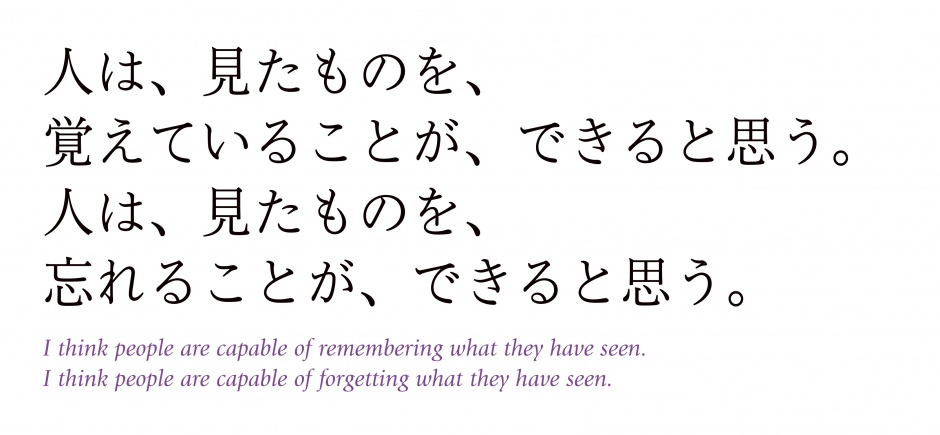vol.
012
MARCH
2016
vol.012 / Special
Unseeing eyes
Sari Hayashiguchi|Shiho Fukuhara|Kenji Kai|Hisashi Kitano|Kunihiko Morinaga|Norimizu Ameya|Nao Tsuda
Bees and cabbage white butterflies can see ultraviolet rays; pit vipers can see infrared rays.
If we had an eye transplant from another organism, we would probably live in an entirely different world.Apparently by sensing things we cannot see, we can sometimes visualize them.
The outer space, life, distance, consciousness, words, time: six people turned their eyes towards these.
We’re talking about seeing the unseen world.
Sari Hayashiguchi|Shiho Fukuhara|Kenji Kai/Hisashi Kitano|Kunihiko Morinaga|Norimizu Ameya|Nao Tsuda
Words
People perceive the world through words
Norimizu Ameya

A play is not something you experience in text form; it reaches the audience only when somebody speaks. What you might call the onstage “extraction” through a person’s voice of words “compressed” at the script stage. So when I write your lines, I consider whether they are words you might want to say aloud, to extract.
When I think about verbal originality, sometimes I feel there’s no such thing as unique words. If you point at a cup and pronounce it “cuk”, you won’t be understood. Language has rules, and we understand it precisely because they are shared. Language must be essentially ordinary.
I’m not very good at talking, and I always thought words were my weak point. But maybe that’s not the case. When I look at a dog and recognize it as a dog, I’m already using, classifying and sorting the word “dog”. There is always more variety, but unless you classify it in words as a “thin”, “old” or “brown” dog etc., you won’t recognize it as such. Even something vague and abstract from the world around you can only be substantiated, expressed, with words. So in every setting whether in work or daily life, I think I’m deeply reliant on words.
When you think about it, putting something into words might be rendering everything very trivial. For example, we can call a dog a dog because they’re everywhere. But that dog is just one dog. And we all know the meaning of the word “love” — and undoubtedly don’t know it either. It may be that we can communicate it in words when we understand the meaning, and also go on saying the word when we don’t understand the meaning.
Words are very two-sided, incomplete and mysterious things. What you might call the “commonness” and “uniqueness” a work of art can have is just like that, i.e. contradiction itself.
Editing & Written by Rina Hirabayashi / Playce
Translation: Office Miyazaki, Inc.



